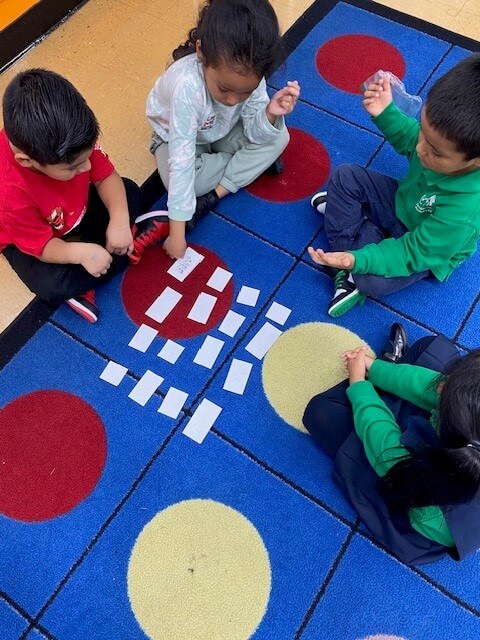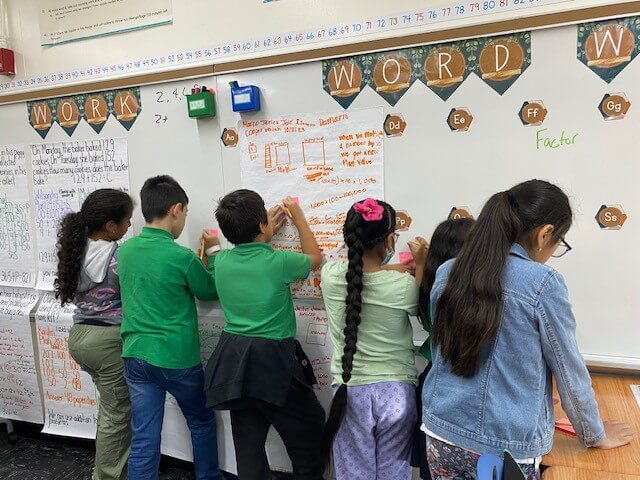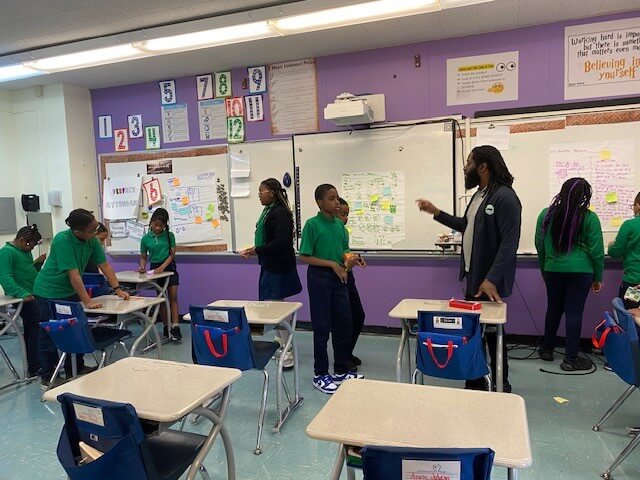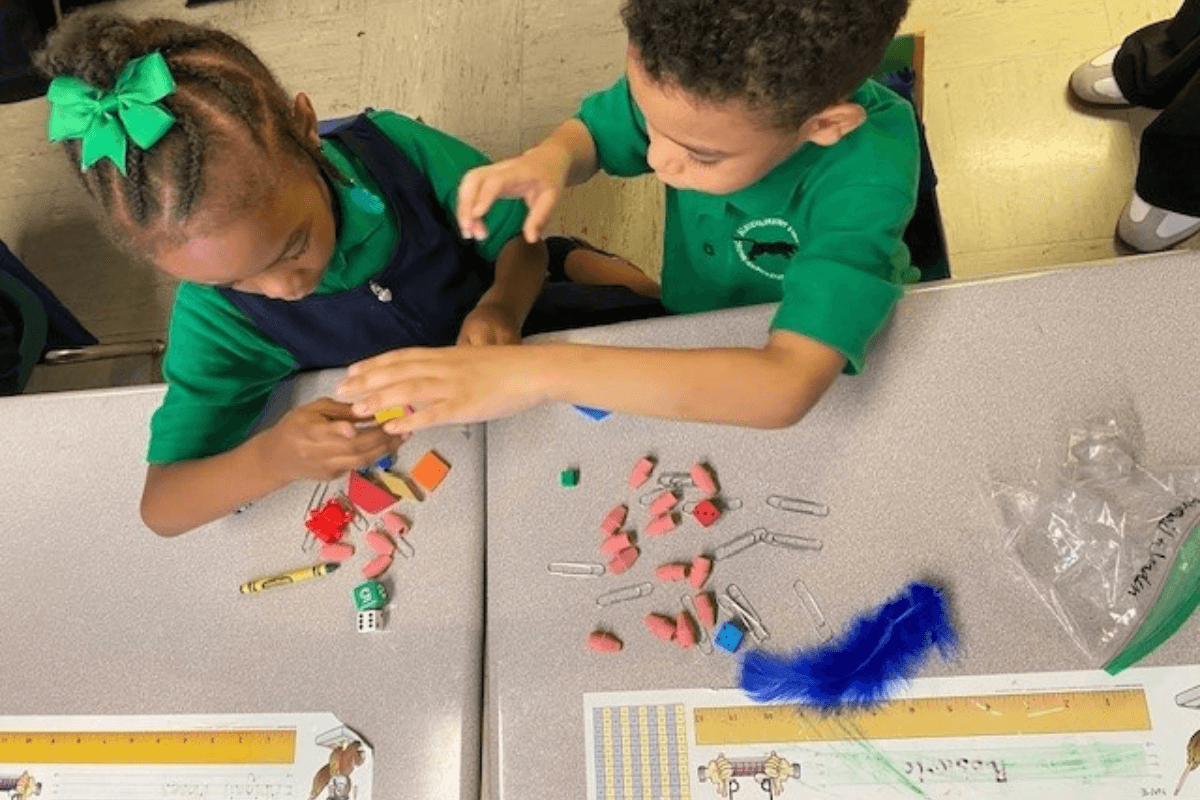At Achievement First, we continuously strive to inspire students through innovative teaching practices. In this blog, we hear from Alicia Lynch, Senior Director of K-8 Math, as she shares insights into the Context for Learning Mathematics program—a new initiative changing how students experience and understand math in our
elementary schools.
The Context for Learning Mathematics program takes a constructivist approach, grounded in the belief that children come to the classroom with valuable ideas and abilities. Lessons are designed with multiple entry points and high ceilings, ensuring that all students—regardless of skill level—are both challenged and supported.
 North Brooklyn Prep ES Kindergarteners playing a collaborative game to build fluency.
North Brooklyn Prep ES Kindergarteners playing a collaborative game to build fluency.
Meet Alicia Lynch
Alicia Lynch has been with Achievement First since 2009, beginning her journey as a first-grade teacher at
Elm City Elementary. After transferring to
Bushwick Elementary in New York, she became the K-2 Academic Dean before stepping into her current role. Over the years, Alicia has been deeply rooted in the world of teaching and learning math, even helping to design AF’s curriculum as part of the Curriculum Fellows team. “Math has always been my passion,” Alicia says. Her passion is evident as she leads the charge to reimagine how students learn math at AF schools.
The Origins of the Context for Learning Mathematics Program
In 2019, Alicia and the Teaching & Learning team began to re-evaluate AF’s math curriculum. Although the current curriculum produced good results, it wasn’t fully aligned with their vision of an excellent math classroom—one where students deeply engage with and own their learning. The team explored various options, but Context for Learning Mathematics stood out. “It centers problem-solving as the core design of the lessons,” Alicia explains. “The belief is that if we put meaningful problems in front of kids, they have the ability to problem-solve and uncover strategies on their own.”
For example, third graders exploring multiplication might examine an image of a grocery store with fruits and vegetables arranged in arrays. Students discuss how many items they see and share their strategies to solve the problem. From there, they participate in workshops, work collaboratively, and present their findings through posters and gallery walks. The Math Congress is the heart of the program, where students discuss their strategies and challenge each other’s thinking. Alicia emphasizes, “We treat students like real mathematicians, encouraging them to develop ideas and solutions that reflect their unique perspectives.”
Unlike traditional approaches, this program encourages hands-on exploration. Students collaborate, illustrate strategies, and discuss big ideas, developing ownership of their math learning in an inspiring and engaging way. “This program disrupts the fixed mindset many students have about math. By teaching in a way that sparks curiosity and confidence, we’re showing kids that they’re capable of solving complex problems and thinking like mathematicians.”
 North Brooklyn Prep 4th graders engaging in a gallery walk, leaving comments on their peer’s posters.
North Brooklyn Prep 4th graders engaging in a gallery walk, leaving comments on their peer’s posters.
Expanding the Program Across Achievement First Schools
The pilot program launched three years ago in three New York schools: Apollo, Bushwick, and North Brooklyn Prep Elementary. Starting as a trial, the team learned valuable lessons and introduced supplemental resources to help teachers navigate the curriculum. Over time, the program has expanded across all three AF regions, reaching schools in Hartford, Connecticut, and three in Rhode Island. Today, it is in eight schools, and it plans to reach all 18 elementary schools within the next three years. “This expansion is thoughtful and paced,” Alicia notes. “We know teachers are navigating multiple new curriculums, so we’ve designed it as an opt-in program, providing support and resources along the way.”
Advancing Equity Through Math
Alicia is especially passionate about how this program challenges the deficit mindset often placed on students of color. “Too often, math is approached as remediation for Black and Brown children, rather than recognizing the brilliance they bring to the classroom,” Alicia says. “This program flips that narrative. It shows that every child is capable of independent problem-solving and critical thinking—skills that will serve them for a lifetime.” The program aims to dismantle stereotypes and ensure that AF students, many from underrepresented backgrounds, receive the same opportunities as their peers in elite private schools by fostering positive math identities in young learners.
Looking Ahead
The Context for Learning Mathematics program is already impacting math classrooms at AF. Teachers and leaders report notable shifts in student engagement and understanding. The program inspires students' confidence and curiosity while preparing them for middle school and beyond.
Implementing the program isn’t without its challenges, requiring teachers to adopt a new mindset and teaching style. However, the payoff is clear: students are learning math in authentic, meaningful ways that create both independence and a love for the subject. “This is about more than just improving state test results,” Alicia concludes. “It’s about changing the way we teach math so that every student feels confident, inspired, and ready to succeed.”
 Crown Heights ES 4th graders engaging in a gallery walk, leaving comments for their peers and discussing their noticings with their teacher.
Crown Heights ES 4th graders engaging in a gallery walk, leaving comments for their peers and discussing their noticings with their teacher.
Teacher and Family Feedback
Teachers have expressed excitement about the shift in their classrooms, noting how engaged students are in collaborative problem-solving. Families, too, have shared their pride in seeing their children tackle math in creative and thoughtful ways. With advocates like Alicia, Matilda, and dedicated school leaders across AF, the program is poised to make an even greater impact as it expands to more schools. For Alicia, the most rewarding part of this work is seeing the “aha” moments in both students and teachers as they embrace new ways of thinking about math. As Alicia says, “This program is about unlearning how we were taught math and reimagining it in ways that inspire joy, challenge, and growth.”
Want to learn more about the exciting programs currently underway in our elementary schools? Explore our website or reach out to our admissions team here.
 North Brooklyn Prep ES Kindergarteners playing a collaborative game to build fluency.
North Brooklyn Prep ES Kindergarteners playing a collaborative game to build fluency. North Brooklyn Prep 4th graders engaging in a gallery walk, leaving comments on their peer’s posters.
North Brooklyn Prep 4th graders engaging in a gallery walk, leaving comments on their peer’s posters. Crown Heights ES 4th graders engaging in a gallery walk, leaving comments for their peers and discussing their noticings with their teacher.
Crown Heights ES 4th graders engaging in a gallery walk, leaving comments for their peers and discussing their noticings with their teacher.




